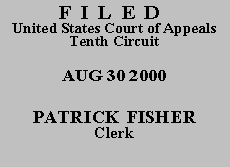

| DUANE P. KINCAID, husband;
SHAREN M. KINCAID, wife,
Plaintiffs-Appellants, v. HAROLD E. STANDRIDGE; DON K. LITTLE, JR.; FARMERS INSURANCE COMPANY, INC.; FARMERS INSURANCE EXCHANGE, Defendants-Appellees. |
|
argument. See Fed. R. App. P. 34(f); 10th Cir. R. 34.1(G). The case is therefore ordered submitted without oral argument.
Duane P. and Sharen M. Kincaid ("the Kincaids") appeal from a final judgment entered in favor of appellees and from denial of their motion made pursuant to Fed. R. Civ. P. 59 to set aside the jury verdict and enter judgment in their favor, or in the alternative, for new trial. We have jurisdiction under 28 U.S.C. § 1291, and we affirm.
The district court's October 13, 1998 order denying the Kincaids' Rule 59 motion sets forth the underlying facts of the case and we need not repeat them here. In reviewing the court's rulings, we initially apply an abuse of discretion standard to the denial of the Rule 59 motion, see Phelps v. Hamilton, 122 F.3d 1309, 1324 (10th Cir.1997), reviewing de novo the district court's denial of the Kincaids' underlying Fed. R. Civ. P. 50 motion for judgment as a matter of law, see Haines v. Fisher, 82 F.3d 1503, 1510 (10th Cir. 1996). It is appropriate for a district court to enter judgment as a matter of law only "[i]f during a trial by jury a party has been fully heard on an issue and there is no legally sufficient evidentiary basis for a reasonable jury to find for that party on that issue." Fed. R. Civ. P. 50(a). "[W]e may find error in the denial of a motion for judgment as a matter of law only if the evidence points but one way and is susceptible to no reasonable inferences supporting the party opposing the motion," construing the evidence and inferences in the light most favorable to the nonmoving party. Powers v. MJB Acquisition Corp., 184 F.3d 1147, 1151 (10th Cir. 1999) (citation and quotation omitted).
The Kincaids argued below and on appeal that because Harold E. Standridge, one of the defendants-appellees, admitted to negligence in causing a minor collision between his automobile and that of the Kincaids, the district court erred in failing to enter judgment as a matter of law on the issue of his liability to the Kincaids for damages. In response to these arguments, the district court noted that "[t]he evidence in the record did not point solely in Plaintiffs' direction." Appellant's App., Vol. I at 151. On appeal, the Kincaids focus on the fact that Mr. Standridge's negligence in causing the collision is unrebutted in the record. Mr. Standridge's admitted breach of his duty to drive in a manner that does not cause a collision does not, as they imply, necessarily lead to a conclusion that the collision caused the damages upon which liability is premised. See Akin v. Missouri Pacific R. Co., 977 P.2d 1040, 1054 (Okla. 1998) ("Three evidentiary elements are essential to a prima facie case of negligence: (1) a duty owed by the defendant to protect the plaintiff from injury, (2) a failure properly to exercise or perform that duty, and (3) an injury to plaintiff proximately caused by the defendant's breach of that duty.").
The record shows that, although one medical expert attributed Sharen Kincaid's back and neck problems to the automobile collision, other evidence indicated that she had not been injured in the collision, that she had preexisting back and neck problems for which she had sought medical treatment, that she had hurt her neck while bowling after the automobile collision, and that she had a degenerative condition in her spine that precipitated her surgery. The jury concluded, upon this evidence, that the defendants-appellees were not liable for the damages alleged by the Kincaids. There was a legally sufficient evidentiary basis for the jury to find for defendants on the issue of causation. We find no error in the district court's denial of the Rule 50 motion for judgment as a matter of law, and, accordingly, also conclude that the court did not abuse its discretion in denying the Kincaids' Rule 59 motion.
The judgment of the United States District Court for the Northern District of Oklahoma is AFFIRMED.
Entered for the Court
Circuit Judge
*. This order and judgment is not binding precedent, except under the doctrines of law of the case, res judicata, and collateral estoppel. The court generally disfavors the citation of orders and judgments; nevertheless, an order and judgment may be cited under the terms and conditions of 10th Cir. R. 36.3.